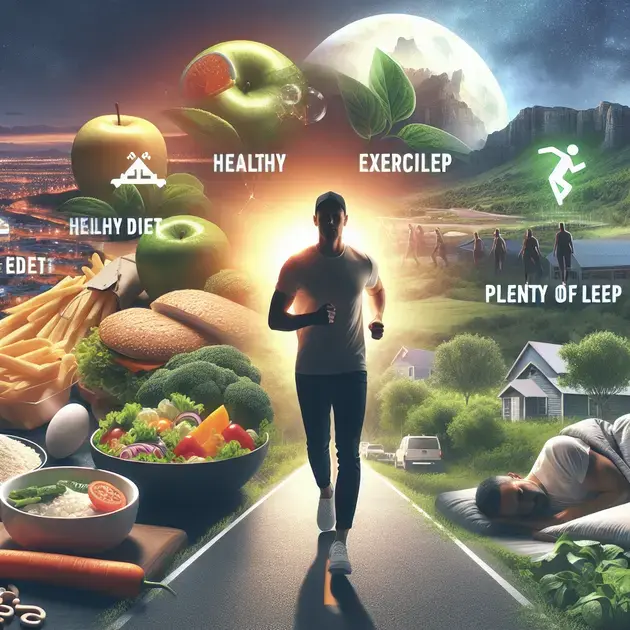Are you ready to embark on a journey towards a healthier you? In this ultimate guide to weight loss, we will provide you with the most effective tips and strategies to help you achieve your fitness goals.
With obesity rates on the rise, it’s more important than ever to prioritize your health and well-being. By following the advice in this comprehensive guide, you can make sustainable changes to your lifestyle and see lasting results.

Effective Weight Loss Strategies to Kickstart Your Journey
Embarking on a weight loss journey can be both exciting and challenging. To kickstart your path to a healthier lifestyle, it’s essential to implement effective strategies that will set you up for success. One proven method is to start tracking your food intake and physical activity. Apps like MyFitnessPal or Fitbit can help you monitor your daily caloric intake and track your steps, making it easier to stay accountable.
In addition to tracking, incorporating regular exercise into your routine is crucial for weight loss. Websites like Bodybuilding.com provide workout plans for all fitness levels, allowing you to find a program that suits your needs. Whether you prefer cardio, strength training, or yoga, finding an activity you enjoy is key to staying consistent.
Another important strategy is to prioritize sleep and stress management. Lack of sleep and high stress levels can negatively impact your weight loss efforts. Utilize apps like Headspace for guided meditation and relaxation techniques to help reduce stress. Additionally, establish a bedtime routine using apps like Sleep Cycle to improve the quality of your sleep.
Setting realistic goals and celebrating your progress along the way is essential for long-term success. Websites like SparkPeople offer goal-setting tools and a supportive community to keep you motivated. Remember, sustainable weight loss is a journey, not a race. By implementing these strategies and utilizing available resources, you can kickstart your weight loss journey with confidence.
Proven Tips for Sustainable Weight Loss Results
When it comes to achieving sustainable weight loss results, consistency is key. One effective tip is to focus on creating healthy habits that you can maintain long-term. Apps like Noom provide personalized coaching to help you establish sustainable lifestyle changes, such as mindful eating and regular exercise.
Meal planning and preparation are also essential strategies for long-term weight loss success. Websites like Eat This Much offer meal planning services based on your dietary preferences and caloric needs. By prepping your meals in advance, you can avoid impulsive food choices and stay on track with your nutrition goals.
Staying hydrated is another crucial tip for sustainable weight loss. Apps like WaterMinder can help you track your daily water intake and remind you to stay hydrated throughout the day. Proper hydration not only supports your overall health but also aids in weight loss by promoting satiety.
Regularly monitoring your progress and adjusting your plan as needed is a smart strategy for long-term success. Websites like Lose It! allow you to log your meals and track your weight loss journey. By reviewing your data regularly, you can identify patterns, celebrate achievements, and make informed decisions to keep progressing towards your goals.
Remember, sustainable weight loss is about making gradual changes and forming lasting habits. By implementing proven tips and utilizing available tools, you can achieve long-term results and maintain a healthy lifestyle for years to come.
Achieving Your Fitness Goals: The Ultimate Guide to Weight Loss
When it comes to achieving your fitness goals and reaching your desired weight, having a comprehensive plan in place is essential. One key step is to create a workout schedule that includes a mix of cardiovascular exercise, strength training, and flexibility exercises. Apps like Nike Training Club offer a variety of workout routines designed by fitness experts to help you achieve your goals.
Setting specific and measurable fitness goals is crucial for tracking your progress and staying motivated. Websites like Runkeeper allow you to set running or walking goals, track your workouts, and analyze your performance over time. By setting milestones and regularly evaluating your achievements, you can stay focused and committed to your fitness journey.
Incorporating variety into your workouts can help prevent boredom and plateaus in your progress. Apps like 7 Minute Workout provide quick, high-intensity routines that you can do anywhere, while apps like Yoga Studio offer guided yoga sessions for all levels. By mixing up your routine and trying new activities, you can challenge your body and continue making fitness gains.
Utilizing resources like fitness trackers and heart rate monitors can provide valuable data to optimize your workouts and track your fitness improvements. Websites like Fitbit offer wearable devices that track your activity levels, heart rate, and sleep patterns, giving you insights into your overall health and fitness progress.
Ultimately, achieving your fitness goals requires dedication, consistency, and a willingness to adapt your plan as needed. By following this ultimate guide to weight loss and utilizing the tools and apps available, you can transform your fitness journey and make significant strides towards a healthier and happier version of yourself.

**Effective Weight Loss Strategies to Kickstart Your Journey**
Setting Clear and Achievable Goals
When embarking on a weight loss journey, it is important to start by setting clear and achievable goals. By setting specific targets for weight loss, such as losing a certain number of pounds within a defined timeframe, individuals can create a roadmap for their journey. These goals should be realistic and tailored to the individual’s current fitness level, lifestyle, and preferences.
Step-by-step guide:
1. Assess your current weight and determine a healthy and sustainable goal weight.
2. Break down your overall goal into smaller, manageable targets to track your progress effectively.
3. Consider consulting with a healthcare professional or a certified nutritionist to help you set realistic and safe weight loss goals.
4. Regularly review and adjust your goals as you progress on your weight loss journey.
5. Celebrate achieving each milestone along the way to stay motivated and focused.
Adopting a Balanced and Nutritious Diet
One of the key components of effective weight loss is adopting a balanced and nutritious diet. Consuming a variety of nutrient-dense foods such as fruits, vegetables, lean proteins, and whole grains can support weight loss efforts while providing essential vitamins and minerals for overall health. Avoiding processed foods high in added sugars and unhealthy fats is crucial for sustainable weight loss.
Step-by-step guide:
1. Prioritize whole foods and minimize the intake of processed and refined products.
2. Include a mix of macronutrients (carbohydrates, proteins, and fats) in each meal for balanced nutrition.
3. Plan your meals in advance to ensure you have healthy options readily available and avoid impulse eating.
4. Stay hydrated by drinking an adequate amount of water throughout the day to support metabolism and curb cravings.
5. Consider keeping a food journal to track your daily intake and identify areas for improvement in your diet.
**Proven Tips for Sustainable Weight Loss Results**
Incorporating Regular Physical Activity
Physical activity plays a crucial role in achieving sustainable weight loss results. Incorporating regular exercise routines that include both cardiovascular activities and strength training can help boost metabolism, burn calories, and build lean muscle mass. Finding activities that you enjoy and can commit to on a consistent basis is key to long-term weight management.
Step-by-step guide:
1. Choose activities that you enjoy, whether it’s running, dancing, cycling, or weightlifting, to make exercise a more enjoyable experience.
2. Aim for at least 150 minutes of moderate-intensity aerobic exercise or 75 minutes of vigorous-intensity aerobic exercise per week.
3. Include strength training exercises at least twice a week to build muscle and increase metabolism.
4. Incorporate active habits into your daily routine, such as taking the stairs instead of the elevator or going for a walk during your lunch break.
5. Listen to your body and adjust your workout intensity and duration based on your fitness level and goals.
Practicing Mindful Eating Habits
Mindful eating involves being present and attentive while consuming food, allowing for a deeper connection with hunger and satiety cues. By paying attention to portion sizes, eating slowly, and savoring each bite, individuals can better regulate their food intake and prevent overeating. Mindful eating can also enhance the overall enjoyment of meals and promote a healthier relationship with food.
Step-by-step guide:
1. Eliminate distractions while eating, such as watching TV or scrolling on your phone, to focus on the sensory experience of eating.
2. Chew your food thoroughly and take breaks between bites to allow your body to signal fullness.
3. Tune in to your hunger and fullness cues to eat when you are truly hungry and stop when you are satisfied.
4. Practice gratitude for the nourishment that food provides, fostering a positive mindset towards eating.
5. Seek support from a therapist or counselor if emotional eating patterns are impacting your relationship with food.
**Achieving Your Fitness Goals: The Ultimate Guide to Weight Loss**
Building a Supportive Environment
Creating a supportive environment that fosters healthy habits and positive behaviors is essential for achieving long-term fitness goals. Surrounding yourself with like-minded individuals who share your commitment to health and wellness can provide motivation, accountability, and encouragement throughout your weight loss journey. Building a support network of friends, family, or online communities can enhance your chances of success.
Step-by-step guide:
1. Share your fitness goals with loved ones and ask for their support and understanding as you make lifestyle changes.
2. Join fitness groups or classes to connect with individuals who share similar goals and interests.
3. Seek out a workout buddy to keep you motivated and accountable during exercise sessions.
4. Participate in online forums or social media groups dedicated to weight loss and fitness for additional support and guidance.
5. Celebrate achievements and milestones with your support network to reinforce positive habits and behaviors.
Monitoring Progress and Adjusting Strategies
Monitoring your progress throughout your weight loss journey is crucial for evaluating the effectiveness of your strategies and making necessary adjustments. Tracking various metrics such as weight, measurements, body fat percentage, and fitness performance can provide valuable insights into your overall progress and help you stay on track towards your fitness goals. By regularly reassessing your approach and adapting your strategies as needed, you can optimize your results and sustain long-term success.
Step-by-step guide:
1. Establish a tracking system to monitor key indicators of progress, such as a fitness journal or a digital tracking app.
2. Set regular check-in points to review your results and identify areas of improvement or potential obstacles.
3. Consult with a fitness coach or trainer to receive feedback and guidance on adjusting your workout routines and nutrition plan.
4. Stay flexible and open-minded to trying new strategies or techniques based on your evolving needs and goals.
5. Celebrate your progress and achievements along the way, recognizing the hard work and dedication you have put into your fitness journey.
**
conclusion
**
Embarking on a weight loss journey requires setting clear and achievable goals tailored to your fitness level and preferences. By breaking down your goals into manageable targets, consulting with professionals, and celebrating milestones, you can stay focused and motivated.
Adopting a balanced and nutritious diet rich in whole foods while minimizing processed products is crucial for effective weight loss. Planning meals, including diverse macronutrients, staying hydrated, and keeping a food journal can support your journey.
Incorporating regular physical activity, such as cardio and strength training, plays a vital role in sustainable weight loss. Finding activities you enjoy, setting exercise goals, and listening to your body are key components of long-term weight management.